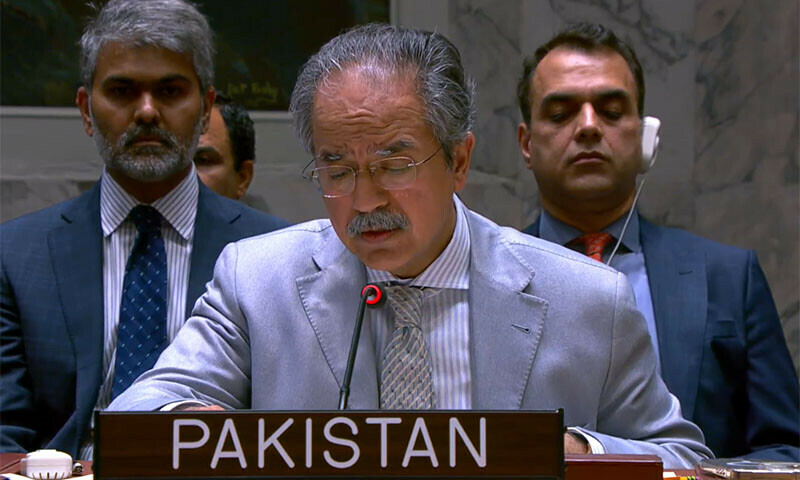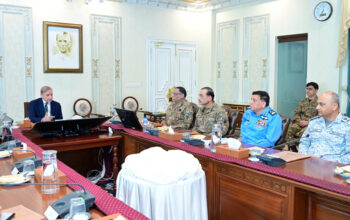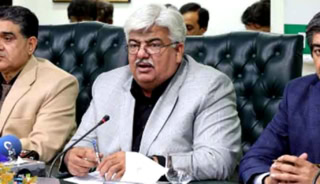By Staff Reporter
ISLAMABAD: Pakistan, China, and Russia are set to present a joint resolution to the United Nations Security Council calling for an immediate and unconditional ceasefire in the Middle East, following U.S. airstrikes on Iranian nuclear facilities.
The proposal, slated for discussion during a Security Council meeting on the US military action, comes amid mounting international concern over a potential escalation in an already volatile region.
The draft resolution, circulated among Security Council members, condemns the “attacks against peaceful nuclear sites and facilities under the IAEA safeguards in the Islamic Republic of Iran,” asserting that such actions “represent a threat to international peace and security, and to the entire safeguards regime of the IAEA.”
It calls for “an immediate and unconditional ceasefire” and advocates a “diplomatic solution to the nuclear issue” that would guarantee the “exclusively peaceful nature of the Islamic Republic of Iran’s nuclear program in exchange for complete lifting of all multilateral and unilateral sanctions.”
The timeline for a vote remains uncertain, with the three nations requesting comments from other Security Council members by Monday evening. Passage requires at least nine votes in favor and no vetoes from the five permanent members: the United States, France, Britain, Russia, or China. Given its role in the airstrikes, the United States is expected to oppose the measure.
“Pakistan, China and Russia jointly have drafted a resolution, and it is hoped that other countries like Algeria may also become its approvers,” local media quoted a Pakistan official in the UN as saying. The draft has been shared with member countries for feedback, a standard step before formally tabling it in the Security Council.
Global Reactions Intensify
The resolution follows Iran’s urgent request for a Security Council meeting to address what it called “this blatant and unlawful act of aggression,” urging the 15-member body “to condemn it in the strongest possible terms.” The US strikes, which President Donald Trump claimed had “obliterated” Tehran’s key nuclear sites, mark the most significant Western military action against Iran since its 1979 revolution, undertaken in coordination with Israel.
UN Secretary-General António Guterres warned of dire consequences, describing the strikes as a “dangerous escalation in a region already on the edge – and a direct threat to international peace and security.” In a statement, he urged de-escalation: “At this perilous hour, it is critical to avoid a spiral of chaos. There is no military solution. The only path forward is diplomacy. The only hope is peace.”
Pakistan’s Plea for Diplomacy
Addressing the Security Council, Pakistan’s Ambassador Asim Iftikhar Ahmad pressed for dialogue over military action. “The Middle East, already burdened by prolonged instability, a history of Israeli illegal occupation and continued denial of the Palestinian right to self-determination and statehood, cannot absorb another crisis,” he said. “We must act now to prevent the situation from further spiralling out of control.”
Outlining the resolution’s key elements, Ahmad noted it “calls for an immediate and unconditional ceasefire; urges all parties to refrain from urgent escalation, demands the urgent protection of civilians and civilian infrastructure and supports a diplomatic path forward on the Iranian nuclear issue that is acceptable to all parties.” He voiced optimism about its reception, stating, “In listening to similar concerns and priorities expressed … today, we sincerely hope that the draft resolution will receive the council’s support, enabling it to respond with unity and resolve, urgently and effectively, in line with the gravity of the situation.”
Ahmad sharply criticized the U.S. strikes, warning they “set a dangerous precedent and pose a grave threat to the safety and security of populations across the region and, indeed, the world.” He called on the Security Council, “the body entrusted with the primary responsibility for the maintenance of international peace and security,” to “act urgently and decisively.” Pakistan, he added, “stands in solidarity with the government and brotherly people of Iran during this challenging time.”
The ambassador also highlighted regional support for de-escalation, noting that the Organisation of Islamic Cooperation (OIC) had issued similar calls during its Council of Foreign Ministers meeting on Sunday. He emphasized Pakistan’s diplomatic efforts, with its leadership, including the deputy prime minister, engaging “through numerous and continuing contacts with other leaders and our partners, all in the name of preserving international peace and security.”
Iranian Ambassador Moghadam
In Islamabad, Iran’s Ambassador to Pakistan, Dr. Reza Amiri Moghadam, delivered a stark warning at the National Press Club, suggesting Iran could retaliate by targeting U.S. interests in the region. “As you know that the US is thousands of kilometres away from Iran, but it has its presence in the region. In the war, we will see where we will hit the US,” he said. He criticized U.S. bases in Muslim countries, calling it “shameful that the US has its bases in Muslim states that are facilitating the US,” and labeled Israel “also a US base in the region” and an “illegitimate regime” seeking to widen the conflict.
Addressing the strikes’ impact, Moghadam downplayed damage to Iran’s nuclear program. “Our nuclear technology is not a physical thing, but it’s in the minds of our nuclear scientists, so therefore the US strikes have not made any significant harm to our nuclear programme,” he said. He affirmed Iran’s readiness for a prolonged conflict, stating, “We are already prepared to fight a long war against Israel,” but clarified, “We do not want to bring any other Islamic state into this war. However, we are fighting the war of not only Iran but the whole Islamic Ummah.”
Copyright © 2021 Independent Pakistan | All rights reserved




